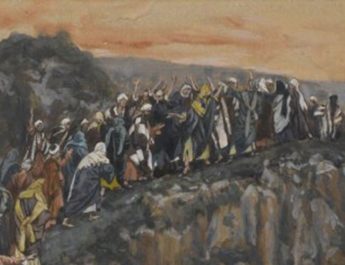Matthew 28:19-20
Narrative Lectionary 102
19 GoA therefore and make disciplesB of allC nations,D
A “go” = poreuomai. From poros (ford, passageway). This is to go, travel, journey, or die. It refers to transporting things from one place to another and focuses on the personal significance of the destination.
B “make disciples” = matheteuo. 4x in NT. From mathetes (a disciple, learner, or student). This to be, make, or train a disciple. It is the same root that “mathematics” comes from.
C “all” = pas. This is all or every.
D “nations” = ethnos. Probably from etho (a custom or culture). This is people who are united by having similar customs or culture. Generally, it is used to refer to Gentiles. This is a tribe, race, nation, or Gentiles in general. This is where the term “ethnicity” comes from.
baptizingE them in the nameF of the FatherG
E “baptizing” = baptizo. From bapto (to dip or dye; to entirely cover with liquid, to stain). This is to submerge, wash, or immerse. Used specially for baptism.
F “name” = onoma. May be from ginosko (know, recognize, learn from firsthand experience). This is a name, authority, cause, character, fame, reputation. The name was thought to include something of the essence of the person so it was not thought to be separate from the person.
G “Father” = pater. This is father in a literal or figurative sense. Could be elder, senior, ancestor, originator, or patriarch.
and of the SonH and of the HolyI SpiritJ
H “Son” = huios. This is son, descendant – a son whether natural born or adopted. It can be used figuratively for other forms of kinship.
I “Holy” = hagios. From hagnos (holy, sacred, pure ethically, ritually, or ceremonially; prepared for worship, chaste, unadulterated, pure to the core; undefiled by sin; figurative for innocent, modest, perfect). God is totally different from humanity and thus set apart. That which is consecrated to worship God (elements of worship) or to serve God (as the saints) are holy because they are now set apart for God’s purposes. Holy because important to God. This is sacred physically, pure. It can be morally blameless or ceremonially consecrated.
J “Spirit” = pneuma. From pneo (to blow, breathe, breathe hard). This is wind, breath, or ghost. A breeze or a blast or air, a breath. Figuratively used for a spirit, the human soul or part of us that is rational. It is also used supernaturally for angels, demons, God, and the Holy Spirit. This is where pneumonia comes from.
20 and teachingK them to obeyL everythingM that I have commandedN you.
K “teaching” = didasko. From dao (learn). This is to teach, direct, instruct, or impart knowledge. In the New Testament, this is almost always used for teaching scripture.
L “obey” = tereo. From teros (a guard or a watch that guards keep); perhaps related to theoreo (gazing, beholding, experiencing, discerning; looking at something to analyze it and concentrate on what it means; the root of the word “theatre” in that people concentrate on the action of the play to understand its meaning); from theaomai (to behold, look upon, see, contemplate, visit); from thaomai (to gaze at a spectacle; to look at or contemplate as a spectator; to interpret something in efforts to grasp its significance); from theoros (a spectator or envoy). This is to guard, observe, keep, maintain, or preserve. It can also be used f iguratively for spiritual watchfulness. It is guarding something from being lost or harmed – keeping an eye on it. Contrast the Greek phulasso, which is to guard something so that it doesn’t escape. Also contrast koustodia, which generally denotes a fortress or military presence. This word can mean fulfilling commands, keeping in custody, or maintaining. It can also figuratively mean to remain unmarried.
M “everything” = pas. Same as “all” in v19. See note C above.
N “commanded” = entellomai. 15x in NT. From en (in, on, at, by, with) + tellomai (to accomplish); {related to telos (end, event, purpose, consummation)}. This is to charge or command – focuses on the final objective. So, this is looking at the final outcome of the command – how things will end up.
And remember,O I am with you always,P to the endQ of the age.”R
O “remember” = idou. From eido (to be aware, see, know, remember, appreciate). This is see! Lo! Behold! Look! Used to express surprise and or draw attention to the statement.
P “always” = pas + ho + hemera. Literally, “all the days.” Pas is the same as “all” in v19. See note C above. Hemera is perhaps from hemai (to sit). This is day, time, or daybreak.
Q “end” = sunteleia. Related to “commanded” in v20. 6x in NT. From sunteleo (to fulfill, accomplish, complete, bring to the desired result, to complete a goal literally or figuratively); {from sun (with, together with) + teleo (to complete, fulfill, accomplish, end); from telos (see note N above)}}. This is completion, end, consummation – joint action or joint payment.
R “age” = aion. From the same as aei (ever, always, unceasingly, perpetually; on every occasion). This is an age, cycle of time, course, continued duration. It is also used to describe the eternal or forever. This is the word used to discuss the present age or the messianic age.
Image credit: “Polar Light 2” – The Aurora Borealis at Eielson Air Force Base, Alaska. Photo by Senior Airman Joshua Strang, 2005.




